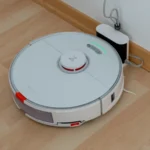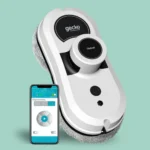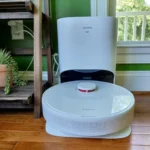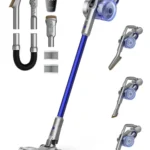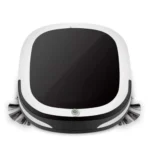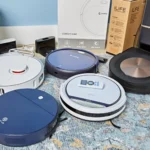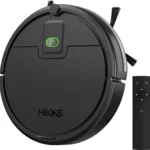As we age or face physical challenges, household cleaning can become a daunting and overwhelming task. However, thanks to technological advancements, we have smart vacuum cleaners that can lend a helping hand. These gadgets are designed with features that not only make cleaning stress-free but also cater to the needs of elderly and disabled people. Smart vacuum cleaners have revolutionized the cleaning industry, providing efficient and autonomous cleaning capabilities that save time and effort. In this article, we will explore the benefits of smart vacuum cleaners for elderly and disabled people and provide a comprehensive guide on how to choose the right one to meet their unique needs.
What are Smart Vacuum Cleaners and How Do They Work?
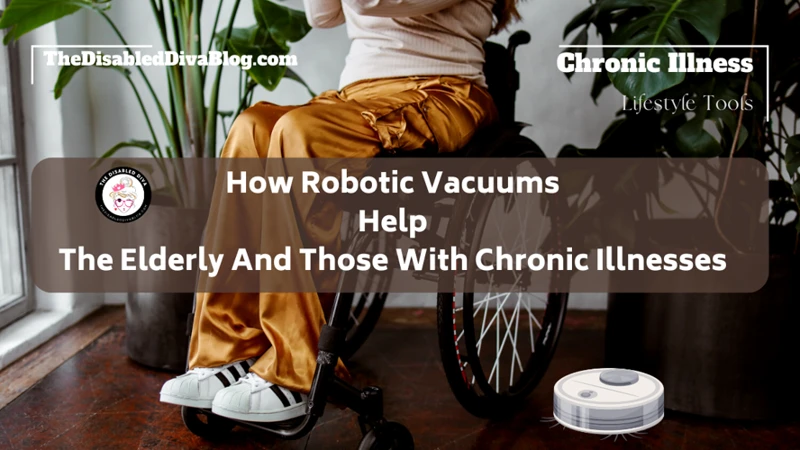
Smart vacuum cleaners are a revolutionary addition to the world of cleaning technology. They have been designed to clean and maintain homes with minimal human input. These robotic devices use advanced technology to navigate around a house, sucking up dirt and debris along the way. With the use of sensors, mapping technology and various other features, they can perform a variety of cleaning tasks with precision and ease.
The Features of a Smart Vacuum Cleaner
Smart vacuum cleaners come packed with various features, all aimed at making cleaning more comfortable and quicker. They are powered by rechargeable batteries and are equipped with sensors that enable them to navigate through and around furniture and other obstacles. These sensors, coupled with mapping technology, allow them to scan and create maps of the rooms they clean. This helps them avoid accidental collisions and repeat cleaning of the same areas.
Additionally, some smart vacuums come with sensors that can detect the amount of dirt and debris on a particular section of the floor. These sensors then adjust the suction power of the vacuum cleaner, ensuring efficient cleaning at all times. Some models also use HEPA filters that can remove tiny particles like dust mites and allergens from the air, leading to improved indoor air quality.
Benefits of Smart Vacuum Cleaners Compared to Traditional Alternatives
While traditional vacuum cleaners require users to be present and manually navigate around a house, smart vacuum cleaners can work autonomously. They can be programmed to start cleaning at specific times, ensuring that cleaning tasks take place even when the homeowner is away. This means they can cover a larger area and reduce the time and effort required for cleaning, making them a brilliant addition to the modern home.
Another notable benefit of smart vacuums is that they can effortlessly reach places that traditional vacuum cleaners cannot. They are designed to move under beds, sofas and perform cleaning tasks in tight spaces. This functionality makes them perfect for households with pets or people with disabilities, ensuring that compromised cleanliness is never compromised.
Conclusion
Smart vacuums are a great innovation that brings new levels of convenience and ease to the lives of elderly and disabled people. They are versatile and adaptable, providing an excellent cleaning solution with minimal human input. By considering the compatibility, battery life, noise level, accessibility, programming and maintenance when choosing the right smart vacuum cleaner, you ensure that the elderly or disabled person you are purchasing for can enjoy the full benefits of this innovative technology.
The Features of a Smart Vacuum Cleaner
When it comes to household cleaning, the advancement in technology has made our lives easier than ever before. And one such remarkable invention is the smart vacuum cleaner that has revolutionized the cleaning process. Smart vacuums come with a plethora of features that make them a popular choice among the elderly, disabled, and tech-savvy individuals. These features include sensors and mapping technology, programming and scheduling, and much more. In the next section, we will discuss some of the benefits of using a smart vacuum cleaner over a traditional vacuum.
Benefits of Smart Vacuum Cleaners Compared to Traditional Alternatives
Smart vacuum cleaners have several benefits when compared to traditional alternatives. Here are some of them:
- Efficiency: Smart vacuum cleaners have proved to be more efficient in cleaning floors compared to traditional vacuum cleaners. Their sensors and advanced technologies allow them to detect and clean dirt in hard to reach areas, making cleaning more thorough and effective.
- Convenience: Unlike traditional vacuum cleaners, smart vacuum cleaners do not require you to be physically present to operate them. They can be scheduled to clean at specific times, or you can control them via a mobile app. This convenience makes cleaning seamless, and it also allows you to focus on other essential tasks.
- Accessibility: Smart vacuum cleaners are designed with several accessibility features that make them easy to use, especially for people with disabilities or the elderly. They can be operated via voice commands, and some models come with remote control for those who may have limited mobility.
- Saves Time: Because smart vacuum cleaners can be programmed to clean at specific times, they eliminate the need for manual cleaning, saving you time and energy. With their automated cleaning features, chores that could take hours to complete using a traditional vacuum cleaner can now be done in minutes.
- Improves Indoor Air Quality: Traditional vacuum cleaners can stir up dust and other allergens, leading to allergic reactions or respiratory problems. Smart vacuum cleaners, on the other hand, use HEPA filters that can trap even the smallest particles, leaving your home free of toxins or other allergens.
- Better for the Environment: Smart vacuum cleaners are eco-friendly and energy-efficient. They use less electricity and are designed to last longer, reducing the amount of waste that is produced. Additionally, since they do not require the use of disposable bags, they are also more environmentally friendly than traditional vacuums.
- Great for Pet Owners: For pet owners, smart vacuum cleaners are incredibly helpful as they can pick up pet hairs and litter effectively. They also help reduce pet odors from the house. Using traditional vacuum cleaners to clean pet hairs can result in allergies, but with smart vacuum cleaners, you can breathe easy knowing that the hair and dander are being filtered out.
These are just some of the benefits of using smart vacuum cleaners over traditional alternatives. However, they are not one size fits all, and you need to consider the features and your needs when selecting one. In the next section, we will highlight how to choose the right smart vacuum cleaner for elderly and disabled people.
Use Cases for Smart Vacuum Cleaners with the Elderly and Disabled
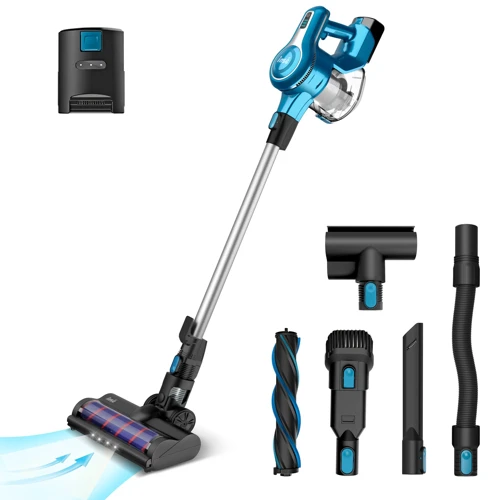
Smart Vacuum Cleaners are becoming increasingly popular with elderly and disabled individuals due to their advanced features and ease of use. Here are some of the primary benefits:
Smart vacuum cleaners provide elderly and disabled individuals with the ability to clean their homes by themselves, thus reducing the need for assistance from caregivers or family members. This independence can help boost self-esteem and promote a sense of control in their environment.
For individuals with respiratory issues, such as asthma or allergies, smart vacuum cleaners can help improve indoor air quality by removing dust, dirt, and other allergens from the home. This can lead to a reduction in symptoms and an overall improvement in health.
Smart vacuum cleaners are designed to operate autonomously, meaning they can be programmed to clean at a specific time and frequency. This feature allows for “set it and forget it” convenience, freeing up time for other activities and providing peace of mind.
Many smart vacuum cleaners are designed with adjustable height settings, making it easy to accommodate individuals who may require a wheelchair or mobility device. They can also navigate through furniture and other obstacles, making it easier for users to get around the home.
Traditional vacuum cleaners can be heavy and difficult to maneuver, which can pose a risk for individuals with limited mobility or strength. Smart vacuum cleaners are lightweight and designed to navigate around obstacles, thus reducing the risk of injury and strain.
Smart vacuum cleaners can help with a range of cleaning tasks beyond just vacuuming. Many models are equipped with advanced sensors and technology that can detect and remove pet hair, allergens, and other debris. This feature can be particularly beneficial for pet owners. For more information on the benefits of smart vacuum cleaners for pet owners, see our article on Smart Vacuum Cleaners and Pet Owners.
For caregivers or family members responsible for assisting with household cleaning, smart vacuum cleaners can provide an extra layer of support. They can be programmed to clean at specific intervals, reducing the need for constant monitoring and allowing caregivers to focus on other duties.
Smart vacuum cleaners are an excellent option for elderly and disabled individuals who need assistance with household cleaning tasks. They provide a variety of benefits over traditional vacuum cleaners, including improved health, convenience, and independence. For more information on the differences between traditional and smart vacuum cleaners, see our article on Smart Vacuum Cleaners vs. Traditional Vacuum Cleaners. Additionally, for information on the environmental benefits of smart vacuum cleaners, see our article on Smart Vacuum Cleaners and the Environment. Finally, if you’re interested in learning about how smart vacuum cleaners can improve indoor air quality, see our article on Smart Vacuum Cleaners and Indoor Air Quality.
1. Independence
As people age or face physical limitations, simple household tasks such as vacuuming can become difficult, overwhelming, or even impossible. This can lead to a loss of independence and an increased need for assistance from others. However, with the advancement of technology, smart vacuum cleaners have become a valuable tool for elderly and disabled individuals in maintaining their independence. A smart vacuum cleaner allows individuals to easily clean their home without the need for physical exertion or assistance from others, providing a sense of empowerment and accomplishment. Let’s explore how smart vacuum cleaners can help promote independence for the elderly and disabled.
2. Improved Health
Smart vacuum cleaners can greatly improve the health of elderly and disabled people in a number of ways. Let’s explore some of them:
1. Improved Air Quality
Smart vacuum cleaners are equipped with HEPA filters that trap even the smallest particles such as dust, pollen, and pet dander. This ensures that the air in the living environment remains clean and healthy to breathe. Poor air quality can lead to respiratory problems, allergies, and other health issues.
2. Reduced Exposure to Chemicals
Many traditional cleaning products contain harsh chemicals that can be harmful to human health, especially for those who are sensitive or allergic to them. By using a smart vacuum cleaner, there is no need to use such products, as the vacuum can effectively clean the floors without any additional chemicals.
3. Reduced Risk of Falls
Elderly and disabled people are at a higher risk of falls and injuries. By using a smart vacuum cleaner, there is no longer a need to move heavy and bulky traditional vacuum cleaners around the house. This reduces the risk of tripping over cords and heavy equipment, thereby reducing the risk of falls and injuries.
4. Reduced Physical Exertion
Using traditional vacuum cleaners can be physically demanding, especially for elderly or disabled people with limited mobility. Smart vacuum cleaners can reduce the physical exertion required to clean the house, enabling them to complete the task with minimal effort.
5. Reduced Stress
Cleaning can be a stressful and tiring task for the elderly and the disabled. By using smart vacuum cleaners, they no longer have to worry about cleaning the floors themselves. This can reduce stress levels and provide some much-needed relief.
Using a smart vacuum cleaner can greatly improve the health of elderly and disabled people in a number of ways. By reducing exposure to allergens, chemicals, and physical exertion, as well as reducing the risk of falls and injuries, smart vacuum cleaners are a great addition to any household with elderly or disabled residents.
3. Set it and Forget it
One of the major advantages of using a smart vacuum cleaner for elderly and disabled people is the ability to set it up and let it run without any further involvement. This feature has become increasingly popular in recent years, as people lead busier lives with less time for household cleaning. With a smart vacuum cleaner, seniors and individuals with disabilities can take comfort in knowing that their floors are being cleaned without any effort on their part.
Here are a few reasons why this “set it and forget it” feature is so useful:
- Less physical effort: For seniors or individuals with disabilities who struggle with mobility, setting up and operating a traditional vacuum cleaner can be taxing. With a smart vacuum cleaner, they can simply press a button and let it do the work, reducing the amount of physical effort required.
- Increased safety: Traditional vacuum cleaners can pose a safety risk, particularly for individuals with mobility issues. The combination of heavy cords and hoses, as well as the risk of falling while operating the vacuum, can lead to dangerous accidents. With a smart vacuum cleaner, the need for cords and hoses is eliminated, reducing the risk of falls and other accidents.
- Effective cleaning: Smart vacuum cleaners use technology such as sensors and mapping to ensure that floors are thoroughly cleaned, even in hard-to-reach areas. This means that elderly and disabled individuals can trust that their floors are being effectively cleaned without having to physically move the vacuum to every spot in the room.
- Time-saving: The “set it and forget it” feature can save a significant amount of time for seniors and disabled individuals. With traditional cleaning methods, floors need to be vacuumed regularly to maintain cleanliness. With a smart vacuum cleaner running on a schedule, elderly and disabled individuals can save precious time and energy that would have been spent cleaning the floors themselves.
The “set it and forget it” feature of smart vacuum cleaners is a game-changer for elderly and disabled individuals who struggle with household cleaning. With this feature, they can reap the benefits of a clean home without having to exert physical effort or sacrifice time. This promotes independence and safety while eliminating the stressful and daunting task of vacuuming floors.
4. Easily Adaptable
Smart vacuum cleaners are incredibly adaptable machines that cater to the unique needs of elderly and disabled individuals. These devices come with a wide range of features that make them easy to adapt, operate and manage at home. For instance, some models of smart vacuum cleaners come with navigational sensors that can navigate around obstacles and adjust their suction power to match the type of flooring. This means you can easily adapt them to the specific needs of the person you’re care giving for.
Another important feature that makes smart vacuum cleaners highly adaptable is their intuitive control system. Many smart vacuum cleaners come with a remote control which means that the user can easily control the device from anywhere in their home. This feature is particularly useful for elderly and disabled individuals who may find it difficult to move around their homes to operate the vacuum cleaner.
Some models of smart vacuum cleaners are equipped with smart home compatibility that allow them to be used with popular smart home virtual assistants such as Amazon’s Alexa, Google Assistant, or Apple HomeKit systems. This means that they can be easily integrated into your smart home ecosystem and controlled with voice commands. For individuals with disabilities, voice control can be a game-changer and provides a new level of independence and convenience.
Table of easily adaptable smart vacuum cleaners:
| Smart Vacuum Cleaner | Adaptability Feature |
|---|---|
| iRobot Roomba i7+ | Can be programmed for specific cleaning schedules and room routines |
| Neato Robotics Botvac D7 Connected | Compatible with Google Assistant and Amazon Alexa virtual assistants |
| Shark IQ Robot Self Empty XL RV1001AE | Self-emptying and has a large dustbin capacity which means less frequent emptying needed |
| Eufy RoboVac 11S | Multiple cleaning modes and auto-adjust cleaning head for adapting to different surfaces |
Smart vacuum cleaners offer a lot of flexibility and customization with regards to the cleaning needs of elderly and disabled people. Their ease of use and adaptability make them great for those who may not be able to handle the regular physical demands of traditional vacuum cleaners. As a caregiver, carefully considering the adaptability features of different models is crucial to make sure that you select a smart vacuum cleaner that fits the specific needs of your elderly or disabled loved one.
5. Reduced Risk of Injury
Smart vacuum cleaners can greatly reduce the risk of injury for elderly and disabled individuals. Traditional vacuum cleaners require a significant amount of physical effort to operate, which can be challenging and even dangerous for individuals with limited mobility or strength. With a smart vacuum cleaner, the user can simply press a button or use a voice command to start the cleaning process, eliminating the need for strenuous activity.
But how does a smart vacuum cleaner reduce the risk of injury, exactly? Let’s take a closer look:
| Reduced Risk of: | Explanation: |
|---|---|
| Slips and Falls | Traditional vacuum cleaners require the user to push and maneuver the device across the floor, which can be risky for individuals with balance or coordination issues. Smart vacuum cleaners, on the other hand, move autonomously and can navigate around obstacles to avoid collisions and falls. |
| Back Pain and Strain | Using a traditional vacuum cleaner often involves bending over, reaching under furniture, and applying force to push and pull the device. This can strain the back and cause pain for individuals who are not able to physically handle these movements. Smart vacuum cleaners can access hard-to-reach areas on their own, saving the user from bending or kneeling. |
| Allergies and Respiratory Issues | Some individuals may have allergies or respiratory issues that are exacerbated by the dust and particles that traditional vacuum cleaners kick up into the air. Smart vacuum cleaners often come equipped with advanced filtration systems that trap dust and dirt, preventing it from circulating in the air and causing breathing problems. |
A smart vacuum cleaner can provide a safer and more comfortable cleaning experience for elderly and disabled individuals, reducing their risk of injury and improving their quality of life.
6. Assistance with Cleaning Tasks
Smart vacuum cleaners are equipped with advanced technology that not only allows them to clean floors but also to offer assistance with various cleaning tasks. Here are some ways in which they can help elderly and disabled people with cleaning tasks:
- Mopping: Some smart vacuum cleaners come with mopping features that can help clean hard floors. With just the push of a button, the vacuum cleaner can perform tasks such as spraying water and cleaning solution, scrubbing the floor, and drying it, leaving the floor looking spotless.
- Dusting: Another way smart vacuum cleaners offer assistance is by dusting surfaces in the home. By using special brushes, they can easily remove dust from shelves, furniture, and other surfaces, making it easier for the elderly or disabled to keep a dust-free home.
- Removing Pet Hair: Many elderly and disabled people own pets for companionship, but pet hair can be a major hassle to clean up. Luckily, some smart vacuum cleaners are designed to remove pet hair from carpets and other surfaces, allowing elderly and disabled pet owners to enjoy spending time with their furry companions without worrying about the mess they make.
- Cleaning Windows: Smart vacuum cleaners can also clean windows, by using suction and a water tank to clean the glass. For elderly or disabled people who may struggle with reaching and cleaning windows, a smart vacuum cleaner can be the perfect solution.
The ability of smart vacuum cleaners to offer assistance with cleaning tasks is a major benefit for elderly and disabled people. By taking care of tasks such as mopping, dusting, removing pet hair, and cleaning windows, they make it easier for those who may struggle with mobility or strength to maintain a clean and comfortable home environment.
7. Peace of Mind for Caregivers
Taking care of elderly or disabled family members can be a tough and demanding task. Caregivers have to ensure that they take care of their loved ones’ health, hygiene, and nutrition. One of the major concerns for the caregivers is maintaining a clean and safe living environment for their elderly and disabled loved ones. This is where smart vacuum cleaners come into play.
Smart vacuum cleaners allow caregivers to have peace of mind as they take care of their loved ones. They can schedule the vacuum cleaners to run at specific times of the day, even when they are not home. They can also set up areas in their homes where the vacuum cleaner should avoid. This ensures that the vacuum cleaner does not accidentally disturb or upset their loved ones while cleaning.
Smart vacuum cleaners have features like obstacle detection and avoidance, which prevents the cleaner from hitting furniture or walls. This means caregivers won’t have to constantly worry about their loved one’s belongings or home decor while the vacuum cleaner is in use.
Another advantage is that smart vacuum cleaners can be controlled and monitored through a mobile app. Caregivers can easily start, stop, or schedule a cleaning session remotely. They can also keep track of the cleaning progress and receive real-time notifications in case of any issues.
Additionally, some models of smart vacuum cleaners are equipped with cameras that allow caregivers to monitor their loved ones’ movements from a distance. This can be helpful in case of an emergency or if the elderly or disabled individual requires assistance.
Smart vacuum cleaners offer caregivers peace of mind as they juggle their responsibilities. With the ability to schedule and control the vacuum cleaner remotely, caregivers can devote their time and energy to other important tasks, knowing that their loved ones’ home is clean, safe, and taken care of.
| Advantages of Smart Vacuum Cleaners for Caregivers |
|---|
| Allows scheduling and running of vacuum cleaner from remote location, giving caregivers more time to focus on other tasks. |
| Obstacle detection and avoidance lessens worries about accidentally damaging elderly or disabled loved ones’ possessions or home decor. |
| Cameras can help monitor elderly or disabled loved ones’ movements and ensure they are assisted in case of emergency. |
| Real-time notifications in case of any issues, giving caregivers peace of mind. |
How to Choose the Right Smart Vacuum Cleaner for Elderly and Disabled People
When choosing a smart vacuum cleaner for elderly and disabled individuals, there are several important factors to consider. Below are some key considerations to keep in mind when making a purchase.
1. Compatibility
It is important to ensure that the smart vacuum cleaner you choose is compatible with other smart devices in the home, such as smartphones or voice assistants. This will allow the user to control the unit remotely, which could be particularly helpful for those with limited mobility.
2. Battery life and Running Time
Smart vacuum cleaners run on batteries and have different battery lives and running times. For individuals who may not be able to charge the unit regularly, it is important to choose a model with a longer battery life and running time.
3. Noise Level
For elderly and disabled individuals who have sensitive hearing, it is important to choose a unit that operates at a low noise level. This will allow the user to comfortably interact with the vacuum cleaner without any discomfort or disturbance.
4. Accessibility
Choose a unit that is easy to operate and handle. It should also have a design that allows the user to easily disassemble it for cleaning or maintenance.
5. Scheduling and Programming
Smart vacuum cleaners come with different scheduling and programming capabilities. It is important to choose a unit that allows users to set up regular cleaning schedules and customize the settings based on individual needs.
6. Maintenance
It is important to choose a model that is easy to maintain. Look for units with washable filters that can be easily replaced without any complicated procedures. This will not only save time but also ensure that the unit operates at maximum efficiency.
Choosing the right smart vacuum cleaner for elderly and disabled individuals requires careful consideration of the needs and requirements of the user. By keeping these key factors in mind, you can make an informed purchase that will help improve the quality of life and reduce the burden of household cleaning.
1. Compatibility
When it comes to choosing the right smart vacuum cleaner for elderly and disabled individuals, compatibility is a crucial factor to consider. It can be perplexing to determine which smart vacuum cleaner is compatible with an individual’s home and specific cleaning needs, especially with the variety of options available in the market. In this section, we will explore the important aspects of compatibility to help guide your decision-making process.
2. Battery life and Running Time
When choosing a smart vacuum cleaner for elderly and disabled individuals, it is important to consider factors such as battery life and running time. This is especially important for those who may have difficulty recharging or replacing the battery themselves.
One way to compare different models is by creating a table that highlights the different factors. Here is an example:
| Brand/Model | Battery Life | Running Time |
|---|---|---|
| Roomba i7+ | 90 minutes | 75 minutes |
| Eufy RoboVac 11S MAX | 100 minutes | 100 minutes |
| Shark IQ Robot Self-Empty XL | 100 minutes | 90 minutes |
As you can see from the table, the Eufy RoboVac 11S MAX has the longest battery life and running time out of the three models listed. However, it is important to keep in mind that other features such as accessibility and maintenance should also be considered when choosing a smart vacuum cleaner.
It is also worth noting that some smart vacuum cleaners have the ability to recharge themselves and resume cleaning where they left off, which can be particularly useful for those who may not be able to physically intervene in the cleaning process.
3. Noise Level
When choosing a smart vacuum cleaner for the elderly and disabled, the noise level is an important factor to consider. Here are some points that can help you make the right decision:
- Low Noise: Choose a smart vacuum cleaner with a low noise level to avoid disturbing the peace of the home. Some smart vacuum cleaners come with a noise level of 55 decibels or below, which is close to the sound of a normal conversation, making it perfect for use in a living room or bedroom.
- Noise Reduction Technology: Some smart vacuum cleaners come with technology that reduces noise levels. Look for vacuum cleaners that feature noise reduction technology such as acoustic insulation or noise-absorbing materials.
- Compatibility with Smart Home Assistants: Choose a smart vacuum cleaner that is compatible with smart home assistants, such as Amazon Alexa or Google Assistant. This will allow you to control your vacuum cleaner using voice commands, eliminating the need to use buttons that could create noise.
- Silencing Feature: Some smart vacuum cleaners come with a silencing feature that reduces the noise level while still providing thorough cleaning. This feature is specifically designed for use at night or in other instances where low noise levels are essential.
By considering these factors, you can select a smart vacuum cleaner that meets your needs without creating unnecessary noise. This ensures that the elderly and disabled can clean their homes without disturbing their environment, allowing them to enjoy a more comfortable living experience.
4. Accessibility
When choosing a smart vacuum cleaner for elderly and disabled people, accessibility is a key consideration. The vacuum cleaner should be easy to use and maneuver, even for those with mobility or dexterity issues. Let’s take a look at some factors to consider when it comes to accessibility:
| Factor | Importance | Considerations |
|---|---|---|
| Weight | High | The lighter the vacuum cleaner, the easier it will be to carry and move around the house. Look for models that weigh less than 10 pounds. |
| Handle Design | High | The handle of the vacuum cleaner should be ergonomically designed, with a comfortable grip that won’t strain the hand or wrist. Look for models with soft-grip handles or handles that are specifically designed for people with arthritis or other hand conditions. |
| Height Adjustability | High | The vacuum cleaner should be adjustable to accommodate people of different heights. Look for models with adjustable handles or extension wands. |
| Cord Length | Medium | The cord of the vacuum cleaner should be long enough to reach all areas of the house without having to switch outlets. Look for models with cords that are at least 20 feet long. |
| Wheels | Medium | The vacuum cleaner should have wheels that can easily and smoothly glide over different types of flooring, including carpets and hardwood floors. Look for models with rubber wheels, which are less likely to scratch or damage floors. |
| Attachments | Low | The vacuum cleaner should come with a variety of attachments and accessories that make it easier to clean different surfaces and hard-to-reach areas. However, attachments aren’t as important as other factors when it comes to accessibility. |
By considering these factors, you can choose a vacuum cleaner that is not only smart and efficient but also accessible and easy to use for elderly and disabled people.
5. Scheduling and Programming
One of the key benefits of a smart vacuum cleaner for the elderly and disabled is the ability to schedule and program the device to clean at specific times. This feature offers convenience as well as freedom from the need to manually control the device. Here are some of the important factors to consider when choosing a smart vacuum cleaner with scheduling and programming capabilities:
| Factor | Description |
|---|---|
| Multiple Scheduling Options | Look for a smart vacuum cleaner that offers multiple scheduling options so that the user can choose the best time for cleaning. This typically includes daily, weekly, or monthly schedules. |
| Smart Home Integration | Many newer models of smart vacuum cleaners come with smart home integration capabilities, which allows users to schedule and control cleaning times using voice commands or through an app on their smartphone or tablet. |
| Remote Scheduling and Control | Remote scheduling and control features allow the user to set cleaning times and control the device even when they are not physically present. |
| Zoning | Zoning capabilities are particularly useful for larger homes. This feature allows the user to divide their home into different zones and schedule cleaning times for each individual zone separately. |
| Customizable Settings | Customizable settings enable users to configure the smart vacuum cleaner to their specific needs. This includes adjusting the cleaning intensity, setting the vacuum to avoid certain areas, and more. |
By considering these key factors, elderly and disabled individuals can choose a smart vacuum cleaner that suits their specific needs and provides the level of autonomy and convenience they are looking for. With scheduling and programming capabilities, they can set it and forget it, and let the smart vacuum cleaner take care of their cleaning needs on a regular basis.
6. Maintenance
When it comes to maintenance, it’s important to consider the upkeep required for a smart vacuum cleaner, especially for elderly and disabled users who may not have the physical ability to perform maintenance tasks. Below is a breakdown of the key maintenance considerations to keep in mind when choosing a smart vacuum cleaner:
| Maintenance Consideration | Importance |
|---|---|
| Cleaning Filters | Regular cleaning of filters is necessary to ensure optimal performance and avoid any potential blockages. Look for models with filters that are easy to access and clean, and consider purchasing extra filters to have on hand. |
| Emptying Dust Bin | Emptying the dustbin is a regular part of vacuum cleaner maintenance, but can be difficult for some users. Look for models with a large dustbin capacity and easy-to-use emptying mechanisms |
| Brushes and Rollers | Over time, brushes and rollers can become tangled with hair and debris, and may need to be removed and cleaned. Consider models with detachable brushes and rollers for easy cleaning. |
| Battery Replacement | Most smart vacuum cleaners are powered by rechargeable batteries, which will need to be replaced eventually. Look for models with good battery life and easy-to-replace batteries. |
These maintenance considerations may seem minor, but they can have a big impact on the overall usability and effectiveness of a vacuum cleaner for elderly and disabled users. It’s important to choose a model that is easy to maintain and designed with user accessibility in mind.
Conclusion
In conclusion, smart vacuum cleaners can be a game-changer for elderly and disabled individuals when it comes to household cleaning. The features and benefits of these devices are numerous, including the ability to promote independence, improve health, reduce the risk of injury, and provide peace of mind for caregivers.
When choosing a smart vacuum cleaner for an elderly or disabled loved one, it’s important to consider factors such as compatibility, battery life and running time, noise level, accessibility, scheduling and programming, and maintenance. With these considerations in mind, it’s possible to choose the right device that will meet the individual’s unique needs and preferences.
Overall, smart vacuum cleaners are an innovative and valuable tool for improving the quality of life for elderly and disabled individuals. By taking advantage of the benefits of these devices, these individuals can enjoy a cleaner living space while minimizing physical strain and maximizing independence.
Frequently Asked Questions
1. Can a smart vacuum cleaner really help the elderly and disabled people with household cleaning?
Yes, it can. Smart vacuum cleaners are designed to make cleaning more efficient, and they can help the elderly and disabled people enjoy an independent life with minimal or no assistance.
2. How do smart vacuum cleaners work?
Smart vacuum cleaners use sensors and cameras to navigate around the house, pick up dirt and debris from floors and carpets, and return to their charging stations when their battery is low. They are powered by a rechargeable battery and can be controlled via a smartphone app or voice commands.
3. What are the key features to look for in a smart vacuum cleaner?
Some important features to look for in a smart vacuum cleaner include compatibility with your smart devices, battery life, noise level, accessibility, scheduling and programming options, and ease of maintenance.
4. How can a smart vacuum cleaner help the elderly and disabled people live more independently?
Smart vacuum cleaners can help the elderly and disabled people live more independently by reducing the need for manual cleaning tasks and minimizing the risk of falls or injuries. They can also be programmed to run automatically while the user is away or occupied with other tasks.
5. Can a smart vacuum cleaner adapt to different types of flooring?
Yes, most smart vacuum cleaners come with sensors that detect different types of flooring and adjust their cleaning modes accordingly. They can switch between hardwood, carpet, and tile floors, for example, and some models can even detect area rugs or high-pile carpets.
6. Can a smart vacuum cleaner replace a traditional vacuum cleaner?
It depends on the specific needs of the user. While smart vacuum cleaners are great for day-to-day cleaning and maintenance, they may not be suitable for deep cleaning or removing tough stains. A traditional vacuum cleaner or carpet cleaner may be more effective in these situations.
7. Are smart vacuum cleaners easy to operate?
Yes, most smart vacuum cleaners are easy to use and can be controlled via a smartphone app, remote control, or voice commands. They usually come with intuitive interfaces and multiple cleaning modes to suit different needs and preferences.
8. Can a smart vacuum cleaner help improve the user’s health?
Yes, by reducing dust and allergens in the air, smart vacuum cleaners can help improve the user’s respiratory health and overall well-being. They can also minimize the risk of falls or injuries associated with manual cleaning tasks.
9. Can a smart vacuum cleaner work with Amazon Alexa or Google Assistant?
Yes, many smart vacuum cleaners are compatible with popular smart speakers and digital assistants such as Amazon Alexa, Google Assistant, and Apple HomeKit. This allows users to control their vacuum cleaner using voice commands or pre-set routines.
10. What is the average lifespan of a smart vacuum cleaner?
The average lifespan of a smart vacuum cleaner depends on the brand, model, and usage frequency. With proper maintenance and care, most smart vacuum cleaners can last for several years before requiring replacement.

